Recent findings published in *Physical Review D* have reignited interest in the concept of primordial black holes existing in our solar system. Unlike black holes that arise from the gravitational collapse of massive stars, primordial black holes are theorized to have originated during the Big Bang. These exotic entities, expected to possess masses similar to asteroids yet dimensions akin to hydrogen atoms, present a fascinating area of research within cosmology, especially in understanding the perplexities surrounding dark matter.
Primordial black holes could potentially play a crucial role in understanding dark matter, which is believed to make up about 85% of the universe’s matter. The formation of these black holes in dense regions of the early universe suggests that they could contribute to the universe’s mass in ways that traditional matter cannot. Their tiny size and considerable mass lead some scientists to propose that they may fulfill some of the characteristics required to explain the elusive nature of dark matter. This connection prompts further investigation into their gravitational influence on the solar system’s structure.
Dr. Sarah Geller from the University of California, Santa Cruz, articulates a compelling hypothesis regarding the gravitational effects of primordial black holes. Her research team aims to model the solar system to investigate whether the peculiar wobbles observed in planetary orbits could be attributed to the pull of these black holes. If the gravitational influence of such minuscule entities can be substantiated, it could fundamentally alter our understanding of planetary motions and celestial dynamics, allowing astronomers to rethink traditional models of solar system architecture.
Enhancing the conversation, Dr. Sébastien Clesse of the Université Libre de Bruxelles proposes an innovative observational strategy focused on satellite movements. By meticulously monitoring the altitudes of satellites, researchers may be able to detect slight variations caused by primordial black holes. This method capitalizes on the existing technology of space probes, which could measure gravitational disturbances indicative of these elusive black holes, thus providing a practical means of identification.
Despite the promising avenues of research, not all scientists are optimistic about detecting primordial black holes. Dr. Andreas Burkert from Ludwig-Maximilians-University Munich raises concerns regarding the complexity of isolating the gravitational effects of these objects from other cosmic phenomena, such as solar winds or asteroid interactions, that could produce similar disturbances. This skepticism highlights the need for refined methodologies in the quest to validate or refute the existence of primordial black holes in our cosmic neighborhood.
The inquiries into primordial black holes extend beyond mere curiosity; they touch on fundamental questions about the composition and evolution of the universe. While the prospect of discovering these entities remains fraught with challenges, the ongoing research serves as a beacon of hope for addressing some of the most pressing mysteries in modern cosmology. As scientists continue to explore these ideas, the potential to reshape our understanding of dark matter and the astrophysical processes at play in our solar system remains tantalizingly within reach.


Leave a Reply